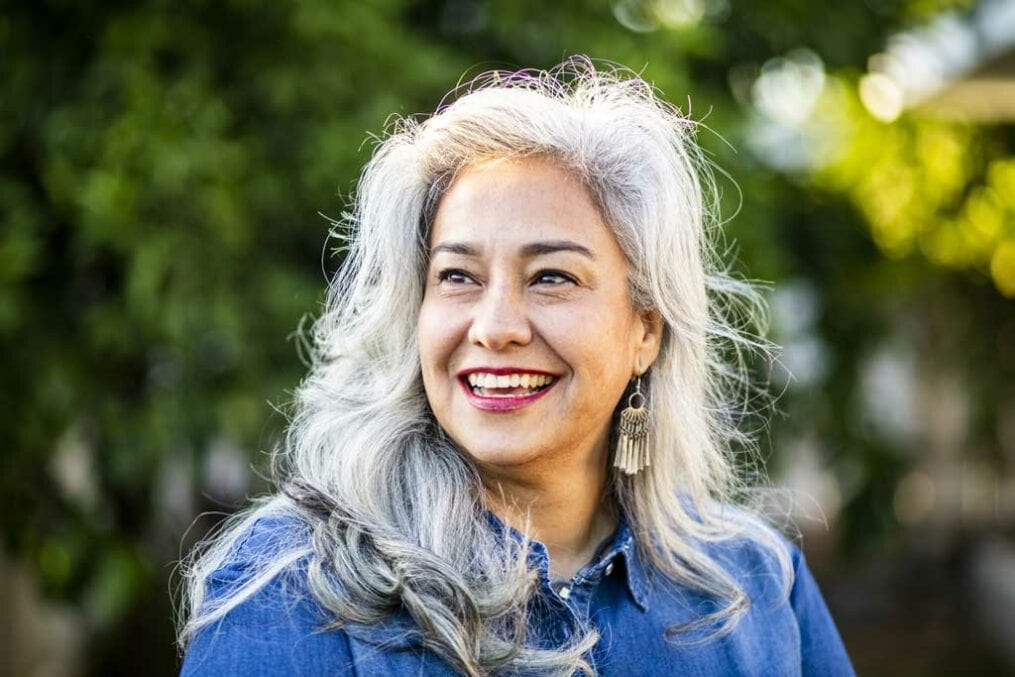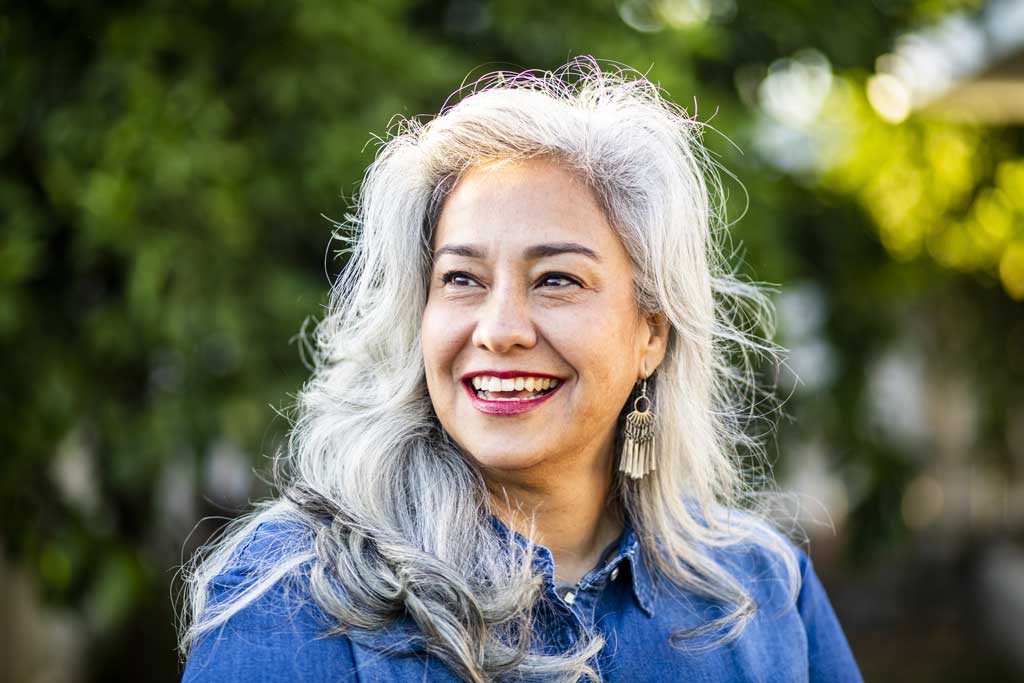Menopause beauty tips

Wrinkles. Dry skin. Eye bags. We’ll happily discuss these with a perfect stranger ‘on-counter’, but when was the last time you heard someone ask for menopause beauty tips? As pivotal a life stage as puberty, with its own set of paradigm shifts for hormones, the conversation surrounding menopause has been fairly hushed. But thanks, in part, to a small group of high-profile women breaking the silence on their own menopausal journeys, things are slowly starting to change.
This growing transparency, and burgeoning discussion around perimenopause – the years or months preceding menopause – has forced beauty brands to sit up and take note. It’s no coincidence that women over 45 now make up 58% of beauty consumers – for this demographic, a dated anti-ageing message no longer cuts the mustard.
The menopause manifests as a dip in oestrogen, the ‘female’ hormone which affects women physically and mentally in many ways. At the same time, androgens (male sex hormones such as testosterone) are ‘unmasked’ by falling oestrogen, sending skin and hair into flux. But it’s not all bad news. With the discussion evolving, and a raft of products, there’s lots to feel positive about. Here are the menopause beauty tips you should know.
Menopause skincare
When dry skin strikes
‘During menopause, there’s a significant loss of hyaluronic acid, an important part of skin hydration – particles hold up to 1000 times their own weight in water,’ explains consultant dermatologist Dr Justine Hextall. ‘We also lose some of the fats in our skin that seal the skin barrier, such as ceramides. These act as the cement surrounding the skin barrier’s “bricks”. As we lose these fats, skin becomes drier and its ability to retain water reduces.’ To counter this double blow of dehydration, apply products containing hyaluronic acid onto slightly damp skin to help boost their hydrating effect, then layer with a rich cream to support the skin barrier.
When you break out like a teenager
While dry skin is common, so is an increase in oil – and associated breakouts – typically on the lower half of the face. ‘The cause of menopausal acne is multifactorial, with hormonal imbalance being the major culprit,’ explains Dr Hextall. ‘Oestrogen levels fall while androgen levels remain the same, causing a relative imbalance.’ Couple this with stress and lack of sleep – insomnia is common in menopause – and there’s no shortage of triggers. ‘Some women develop acne, which is exacerbated by oil-based cosmetics,’ says Dr Zainab Laftah, consultant dermatologist and British Skin Foundation spokesperson. ‘If a trial of salicylic acid cleanser does not help, it may be useful to see a dermatologist for consideration of hormonal therapy.’
When fine lines and wrinkles abound
Until now, wrinkles have been the main focus for anti-ageing brands, but did you know their appearance is directly linked to a drop in oestrogen? ‘Studies suggest up to 30% of collagen can be lost at the time of menopause,’ says Dr Hextall. And while in the early stages this may simply mean more visible lines, ultimately it can lead to sagging as facial fat starts to move downwards. To stimulate new collagen, Dr Hextall recommends various treatments. ‘IPL (intense pulsed light) is good for treating thread veins and sun spots, as well as stimulating new collagen, while micro-needling can be combined with hyaluronic acid and vitamin C to brighten and hydrate.’ In terms of topicals, ‘retinoids (vitamin A) are an option to stimulate new collagen production and improve the appearance of wrinkles,’ advises Dr Laftah.
When you don’t want to burn
As the skin barrier weakens in menopause, so does skin’s natural capacity for protection. ‘Oestrogens have important anti-oxidant properties, not least protecting against free radical damage after exposure to UV or pollution,’ says Dr Hextall, whose menopause beauty tips include taking extra care to protect the skin from the sun. ‘Use a high-factor SPF that protects against UVB and UVA,’ she says. And where there’s sun damage, pigmentation problems follow. ‘The combination of hormonal changes and cumulative sun damage can cause areas of increased skin pigmentation, known as melasma,’ explains Dr Laftah. To counteract UV damage, couple broad spectrum sunscreen with formulas featuring vitamin C – ‘ it helps protect against further damage, while suppressing the enzymes that facilitate the production of melanin,’ says Dr Hextall.
You’re red in the face
Synonymous with the menopause, hot flushes aren’t a skin issue per se, but they feature in a wider story of sensitivity which can spike during menopause. ‘As hormones shift, the skin’s pH changes,’ says Dr Hextall. ‘A change from the naturally acidic barrier leaves skin drier, with increased water loss. You may notice it’s more sensitive, and thread veins appear. Menopause is also a common time to present with rosacea.’ As for flushes, they can start during perimenopause and occur day or night, when the blood vessels suddenly dilate to increase blood flow. ‘Researchers believe this vascular shift is due to changes in neurotransmitter activity that aren’t fully understood, occurring in response to erratic hormones.’
Menopause haircare
When your plughole clogs
Hair, just like skin, is also at the mercy of the menopause. ‘By the time we reach our mid-40s, we’re exhausted and stressed out by day-to-day life, and this can impact our hair,’ says trichologist Cheryl Mackie. ‘Hair can feel less manageable, often due to having a hotter head and increased perspiration which can cause an oily or sweaty scalp, both leading to root level breakage.’
So what’s behind it? ‘Oestrogens help keep strands in their growth phase, and their decline is one reason why many women experience diffuse shedding in the early stages of menopause,’ explains Anabel Kingsley, consultant trichologist at Philip Kingsley. ‘Secondly, because oestrogen levels have dropped, hair has a more androgen-heavy environment to contend with. Androgens are not very hair-friendly. They can be troublesome for women with a genetic predisposition to follicle sensitivity, where even normal levels can cause follicles to shrink and hairs to grow back finer.’
Both Mackie and Kingsley agree the right expert advice, good nutrition, and managing stress, are key.







